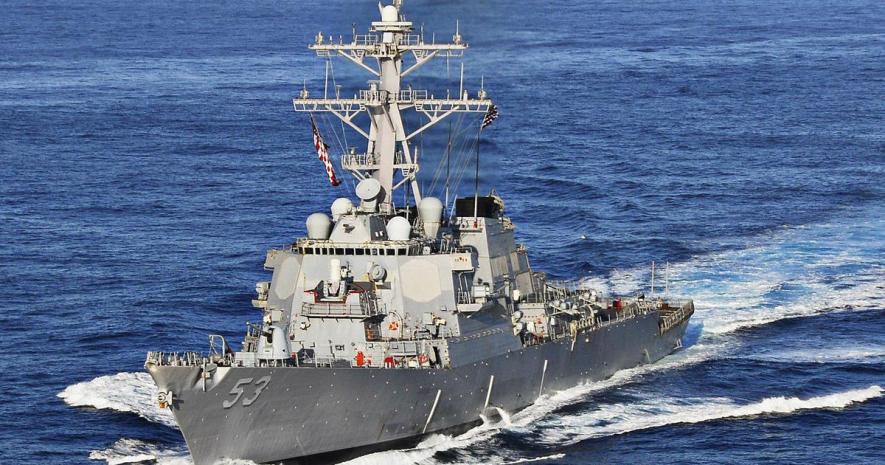US Navy in Lakshadweep: Gunboat Diplomacy Masquerading as Freedom of Navigation

Image Courtesy: Wikimedia Commons
After having endorsed US Freedom of Navigation Operations or FONOP on the South China Sea, the Indian government has had a rude awakening. It has been discovered from a US 7th Fleet announcement that last week a guided-missile destroyer, the USS John Paul Jones, conducted a similar FONOP in India’s Exclusive Economic Zone (EEZ) around Lakshadweep.
The US believes its warships, even those which carry nuclear weapons, have the unfettered right to carry out military exercises and manoeuvres without the consent of coastal states. India, like many other countries, does not believe the existing international law gives any country this right.
India has enacted The Territorial Waters, Continental Shelf, Exclusive Economic Zone and other Maritime Zones Act, 1976, to explicitly codify what it believes its rights are. The US has just shown that it does not care a fig for what India believes. The US considers Indian claims over its maritime territories excessive and inconsistent with its interpretation of international law. It has identified many such "differences” with India, and has conducted FONOPs in the past as well. It reports its FONOPs every year to the US Congress and the details are publicly available.
The Modi government sees the US doing a FONOP in its backyard as a storm in a teacup. This is the media line of a host of US-friendly “experts” who are over the moon ever since India joined the Quad and supported the US policy to contain China. For them, the problem is not the US carrying out FONOPs, but the optics of revealing it in the public domain. After all, the US has carried out such operations in Indian waters and EEZ in the past.
According to Jeff Smith writing in Foreign Policy, “The United States has conducted FONOPs directed at Indian maritime claims regularly since at least 1992. The US Navy conducted at least six India-related FONOPs between then and 2003 and, with two exceptions, every year between 2007 and 2021.”
On the question of the rights of coastal states, it is the US and its NATO allies that are the outliers. Most countries are much closer to India’s interpretation of its rights as a coastal state. And the US is entirely alone in enforcing what it believes its rights are through a military assertion—which is what a FONOP conducted by warships is.
India was also badly caught out in endorsing the US understanding of freedom of navigation in the South China Sea, and then calling it a “global commons”. China’s differences with its neighbours—the Philippines, Vietnam, Malaysia, Indonesia—are not about Freedom of Navigation in the South China Sea as the US claims. Nor is it about a “global commons”. As littoral states, China and its neighbours have disputes over who has what economic rights—fishing, mineral rights, producing energy—in the South China Sea. This is far removed from the South China Sea being a “global commons” over which everybody has equal rights.
The international law on the seas is the United Nations Convention on the Laws of the Sea (1982), or UNCLOS. On the question of navigation, India declared while signing the UNCLOS that “the provisions of the Convention do not authorise other States to carry out in the exclusive economic zone and on the continental shelf military exercises or manoeuvres, in particular, those involving the use of weapons or explosives without the consent of the coastal State.”
This is similar to declarations by China, Vietnam, Indonesia, and other countries in UNCLOS. On the issue of freedom of navigation of warships, China, India, Indonesia, Vietnam are on a completely different page than the US.
While 161 countries have signed UNCLOS, one significant holdout is the US. Its reason for not signing is important: The US right-wing Opposition disagrees with handing over power over the oceans and seabed to an international body. The first point of the Heritage Foundation in the campaign for the US not singing UNCLOS says, “US membership in the convention would not confer any maritime right or freedom that the US does not already enjoy. The US can best protect its rights by maintaining a strong US Navy, not by acceding to the convention.” In other words, might is right, no law is required.
The US has stated on several occasions that it regards freedom of navigation for all purposes, including for military activities, a vital American national interest. The question is, what vital national interest is served by carrying out freedom of navigation 12,000 kilometres from the US coast in the South China Sea? Or in Lakshadweep, which is 15,000 kilometres from the US? The US spells it out in its military doctrine: it needs to maintain dominance in any theatre of the world. This forward military deployment or posture has many benefits for the US, including that it can “maintain an open world economy and give Washington leverage in economic negotiations.”
While the US couches its language for its Freedom of Navigation in international law terms, it carefully does not state what this law is. The problem that the US has with UNCLOS is that it extended the territorial waters for a coastal state from three to 12 nautical miles and created an Exclusive Economic Zone of 200 nautical miles (370 kilometres).
The dispute that the US has with most countries and UNCLOS follows from its belief that freedom of navigation is not restricted by any law of the coastal states. Most countries hold that UNCLOS circumscribes freedom with reasonable restrictions. In the view of most nations and experts, asking countries to give prior notification to coastal states for warships involved in military exercises, which possibly carry nuclear weapons or other hazardous material, is a reasonable restriction.
The second problem with the US carrying out its so-called FONOPs is who gave the US the right to assert its understanding of freedom of navigation militarily? On whose authority is the US asserting this freedom? Simply put, not only does the US believe it has the right to interpret international law any way it pleases, but also that it can enforce its understanding of this law on others—with warships.
When the Modi government endorsed the US understanding of freedom of navigation, it implicitly endorsed the US understanding that the law of the hegemon is international law, not the international treaties and the United Nations. This is what the Western powers are peddling as “a rule-based international order”—where they get to make the rules. This is the “heritage” of western colonialism, settler-colonial states, and their empires. A small matter that these empires were accompanied by genocide, slavery, and loot. Its 21st-century version is the re-emergence of gunboat diplomacy masquerading as Freedom of Navigation Operations.
Get the latest reports & analysis with people's perspective on Protests, movements & deep analytical videos, discussions of the current affairs in your Telegram app. Subscribe to NewsClick's Telegram channel & get Real-Time updates on stories, as they get published on our website.
























